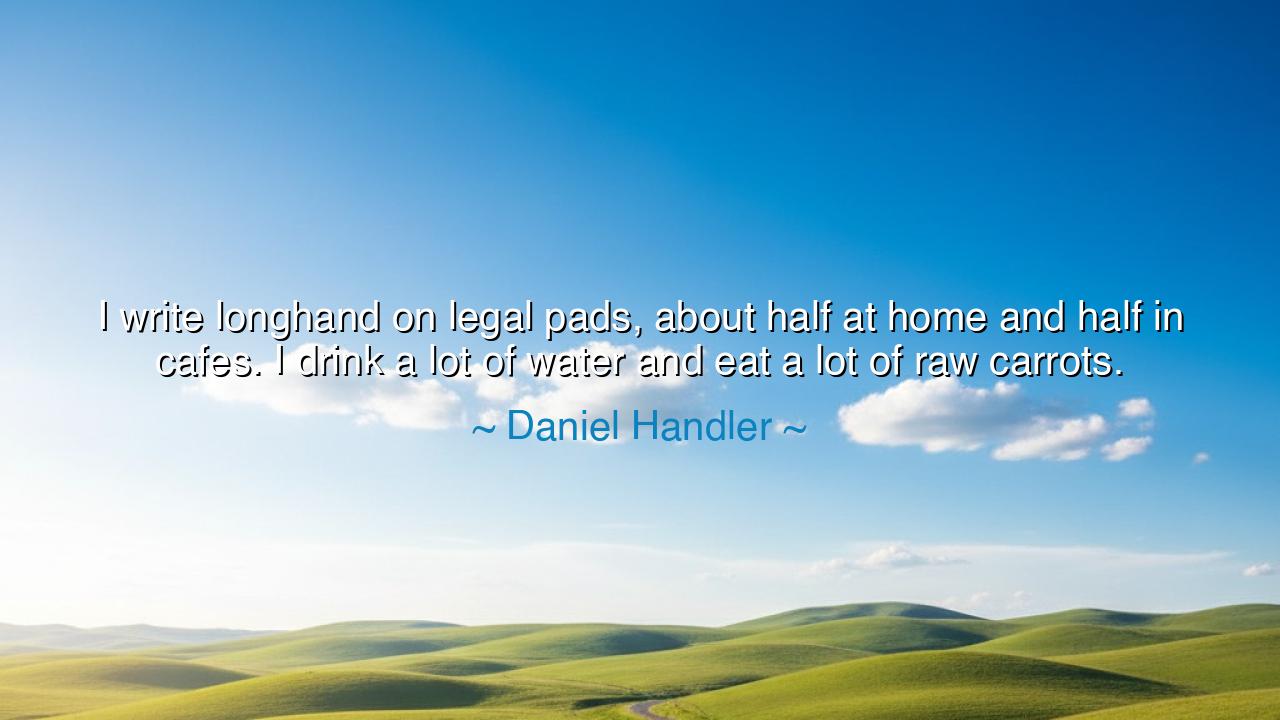
I write longhand on legal pads, about half at home and half in
I write longhand on legal pads, about half at home and half in cafes. I drink a lot of water and eat a lot of raw carrots.






Hearken, O seekers of craft and constancy, to the words of Daniel Handler, who revealed with disarming simplicity: “I write longhand on legal pads, about half at home and half in cafes. I drink a lot of water and eat a lot of raw carrots.” Though these words seem humble, they conceal within them a deep lesson about discipline, ritual, and the sacred rhythm of creation. For in the modern age—an age of speed, distraction, and ceaseless noise—Handler’s practice stands as a quiet rebellion: a return to slowness, to intention, to the tactile communion between mind, hand, and paper.
Since ancient times, the act of writing has been a spiritual labor. Scribes in the temples of Egypt, monks in candlelit monasteries, poets beneath olive trees—all knew that to write by hand is to channel the soul through the fingers. The legal pad, simple and unadorned, becomes in Handler’s hands what the scroll was to the ancients: a vessel of thought. His choice to write longhand is no accident—it reflects a reverence for process, for the deliberate unfolding of words. In the pressure of pen against paper, he finds a rhythm of breathing, a conversation between body and idea.
He writes “half at home and half in cafes,” balancing solitude with the hum of life. This duality mirrors the eternal struggle of all creators: the need for silence and the need for connection. Home is the temple of reflection; the café, the marketplace of humanity. One offers stillness, the other motion. Handler’s habit thus speaks to the wisdom of balance—of drawing energy from both the inner world and the living pulse of society. To create in both spaces is to weave the self into the fabric of the world while preserving one’s inner fire.
And what of the water and the raw carrots? These, too, are symbols, though disguised as habits. The water purifies, sustaining the body and clearing the mind; it reminds us of renewal, of clarity, of life’s simplicity. The carrots, crisp and raw, embody health and focus—earthly roots that nourish the act of imagination. They are metaphors for grounding oneself in the tangible while reaching into the ethereal. In them lies a reminder: the body and mind are not separate instruments but partners in creation. To neglect one is to diminish the other.
Consider the story of Leonardo da Vinci, who also lived by small, peculiar rituals. He rose with the dawn, drew endlessly in notebooks, and ate sparingly so that his thoughts might remain sharp. His genius did not spring from chaos but from discipline, the quiet devotion to pattern and practice. So it is with Handler. His ritual of writing, his measured routine, his humble snacks—all form a kind of sacred order, the scaffolding upon which inspiration descends. The modern artist may look upon such habits as quaint, yet they are the secret architecture of endurance.
Handler’s serenity lies not in grand gestures, but in consistency. “I write longhand,” he says, not because it is fashionable, but because it keeps him close to the labor of thought. The pen slows the mind just enough to make every word a choice. This is a truth the ancients knew well: that wisdom and beauty are born from patience. To write longhand is to listen—to one’s own voice, to silence, to the rhythm of creation itself.
O seekers of purpose, take heed of this lesson. Do not chase brilliance in chaos or inspiration in haste. Build your own rituals—however simple, however strange—that anchor your craft and clear your spirit. Let your tools be humble, your routine steady, your nourishment pure. For in the end, greatness is not forged in moments of frenzy, but in the quiet repetition of honest labor.
So let the legal pad be your scroll, the pen your staff, and the raw carrot your reminder that creation is both sacred and simple. In the stillness between each word, you will find what all writers seek—the harmony of discipline and wonder, the slow unfolding of truth beneath the steady hand.






AAdministratorAdministrator
Welcome, honored guests. Please leave a comment, we will respond soon